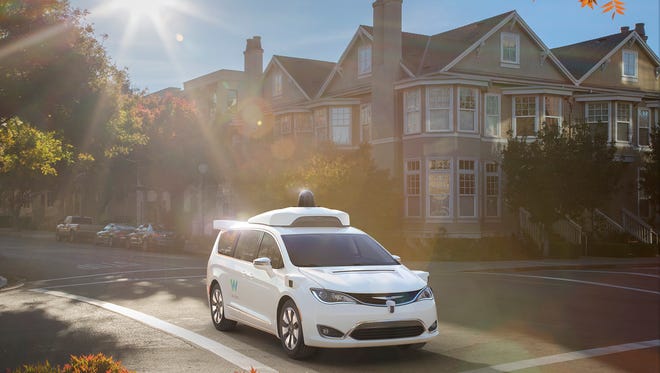Google's self-driving cars are offering free rides

SAN FRANCISCO — Eight years and nearly three million miles after Google began to build self-driving car technology, it's ready for passengers.
Waymo, the search giant's renamed autonomous car company, will begin taking applications Tuesday from Phoenix-area residents who want to be among the hundreds of riders testing out an expanded fleet of Chrysler Pacifica Plug-In Hybrid minivans outfitted with Waymo's myriad autonomous car sensors.
A range of automotive and technology companies have said they aim to produce self-driving cars for ride-hailing programs by around 2020. They include Ford, General Motors, Toyota, Volvo, Nissan and BMW.
But Waymo's Arizona initiative shows it's getting a lot closer to the goal.
By licensing its hardware and software to would be ride-hailing companies, Waymo can look to recoup its multi-year investment in the science while ride-hailing startups can eliminate the most expensive part of their business model: the driver.
"I'd say our business model on this is TBD (to be determined), and the most important thing that's going on here is learning more about how people would actually use such a service," Waymo CEO John Krafcik told USA TODAY a few hours before the announcement.
"It's our first interaction with real people in our cars," he said. "This is a big, big step for us."
Although under Arizona law self-driving cars can be tested without a human safety driver at the wheel, the Pacificas will at least initially have a Waymo employee at the wheel. "But they'll be there to help us gather more information about the way people use our rides," he says. "The car will be doing all the driving."
Uber's self-driving car program was first to pick up passengers in a test program that launched last summer in Pittsburgh. Waymo's pilot program appears to have a more comprehensive scope, both in terms of the sheer number of autonomous vehicles collecting passengers as well as the use-case details Waymo hopes to compile on riders.
Simply making consumers less apprehensive about robots at the wheel could be one of the biggest benefits of Waymo's new program, says Michelle Krebs, executive analyst at Autotrader.
"According to (Autotrader-affiliated) Kelley Blue Book research, the key to acceptance (of self-driving cars) is exposure and education," she says. "It's smart for Waymo to invite the public to take its self-driving Chrysler Pacifica Hybrid minivans for a spin to build confidence in their technology."
The expanded program will make use of 600 self-driving Pacificas, a huge increase from the 100 vehicles delivered last year by partner Fiat Chrysler Automobiles. Krafick's blog post on the news includes directions on how to sign up for the Phoenix program, which launches after a few months of tests with select residents.
The additional 500 custom Pacificas, which Waymo will then outfit with its sensors, will begin production next month, according to FCA CEO Sergio Marchionne.
“The collaboration between FCA and Waymo has been advantageous for both companies as we continue to work together to fully understand the steps needed to bring self-driving vehicles to market,” he said in a statement.

Krafcik says participants will be "encouraged to rely on Waymo for all their transportation needs," ranging from daily commutes to weekend sporting events. He says Waymo is looking for a wide range of users for the "hundreds of riders" it plans to accommodate with its Pacifica program.
Those chosen for the Phoenix pilot will not have to pay for the rides in Waymo's self-driving cars, Krafcik said.
Phoenix was selected as the test market because it's a market where people are very dependent on their cars to get around, he says. The company has been testing its autonomous car technology in other cities, including its headquarters of Mountain View, Calif., Austin and Kirkland, Wash.
Waymo's journey to this point has been deliberate and gradual.

For years, Google engineers tested their radar, camera and LiDAR sensors on a collection of Lexus SUVs. In 2015, a small two-person vehicle of Google's own design began quietly testing around the company's headquarters and then in its other test cities.
Last year, Chrysler delivered the 100 Pacificas Google had requested as part of their partnership, and now 500 more will join the pool.
Waymo self-driving car ride has not been without drama. Last summer, Chris Urmson, the longtime leader of Google's self-driving car project, abruptly took leave of the company. He has since surfaced as head of his own self-driving car company that remains in stealth mode.
A few months ago, Waymo sued Uber, claiming that the LiDAR — critical light detection and ranging tech that helps self-driving cars see where they are — technology being used by Uber-owned Otto, a self-driving truck company, was actually stolen from Google while Otto founder Anthony Levandowski was still working there.
Follow USA TODAY tech reporter Marco della Cava on Twitter.